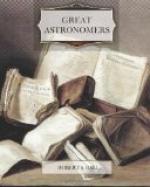His remains were borne to the cemetery on Mont Parnasse in a public funeral. Among his pallbearers were leading men of science, from other countries as well as France, and the memorial discourses pronounced at the grave expressed their admiration of his talents and of the greatness of the services he had rendered to science.
ADAMS.
The illustrious mathematician who, among Englishmen, at all events, was second only to Newton by his discoveries in theoretical astronomy, was born on June the 5th, 1819, at the farmhouse of Lidcot, seven miles from Launceston, in Cornwall. His early education was imparted under the guidance of the Rev. John Couch Grylls, a first cousin of his mother. He appears to have received an education of the ordinary school type in classics and mathematics, but his leisure hours were largely devoted to studying what astronomical books he could find in the library of the Mechanics’ Institute at Devonport. He was twenty years old when he entered St. John’s College, Cambridge. His career in the University was one of almost unparalleled distinction, and it is recorded that his answering at the Wranglership examination, where he came out at the head of the list in 1843, was so high that he received more than double the marks awarded to the Second Wrangler.
Among the papers found after his death was the following memorandum, dated July the 3rd, 1841: “Formed a design at the beginning of this week of investigating, as soon as possible after taking my degree, the irregularities in the motion of Uranus, Which are as yet unaccounted for, in order to find whether they may be attributed to the action of an undiscovered planet beyond it; and, if possible, thence to determine the elements of its orbit approximately, which would lead probably to its discovery.”
After he had taken his degree, and had thus obtained a little relaxation from the lines within which his studies had previously been necessarily confined, Adams devoted himself to the study of the perturbations of Uranus, in accordance with the resolve which we have just seen that he formed while he was still an undergraduate. As a first attempt he made the supposition that there might be a planet exterior to Uranus, at a distance which was double that of Uranus from the sun. Having completed his calculation as to the effect which such a hypothetical planet might exercise upon the movement of Uranus, he came to the conclusion that it would be quite possible to account completely for the unexplained difficulties by the action of an exterior planet, if only that planet were of adequate size and had its orbit properly placed. It was necessary, however, to follow up the problem more precisely, and accordingly an application was made through Professor Challis, the Director of the Cambridge Observatory, to the Astronomer Royal, with the object of obtaining from the observations made at Greenwich Observatory more accurate values




